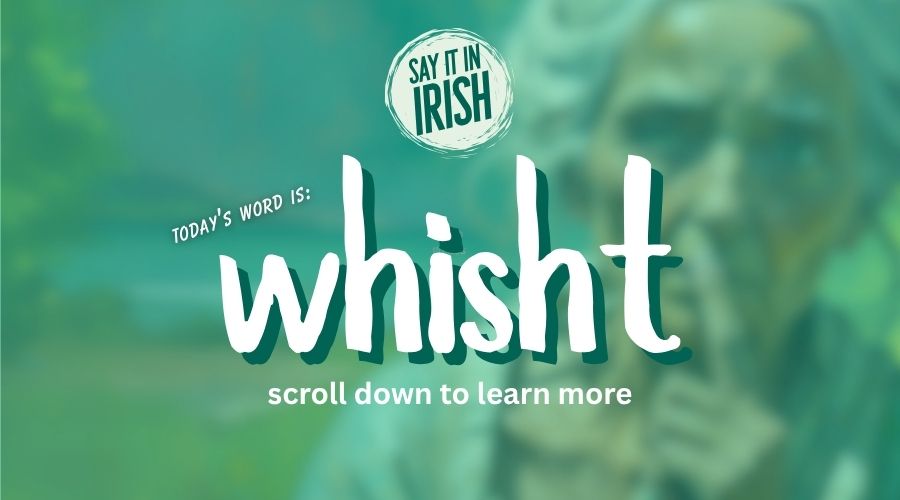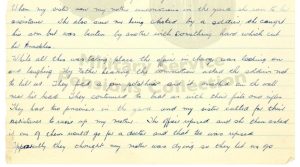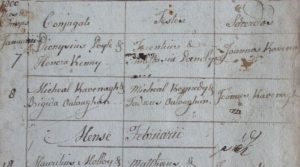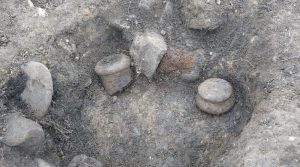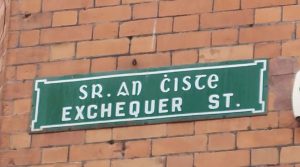Each week, SAY IT IN IRISH features an Irish or Hiberno-English word or phrase, exploring its meaning, history and origins – with an audio recording by a native Irish speaker from Cork so you can hear how it’s pronounced.
Whisht
This week’s word is whisht – a Hiberno-English term used throughout Ireland as an interjection or imperative verb to request silence or command someone to stop making noise and keep quiet.
It can serve as a sharp rebuke, a gentle hush or even a way to calm cattle and sheep. You may simply be instructed to “Whisht!” – or you may encounter it in phrases like “Hold your whisht!” or “Ah, whisht up!” These expressions can also be used to dismiss someone’s complaints or moanings or to defuse a tense or escalating situation. In addition, it can be used to instruct someone to hold their tongue or refrain from revealing information.
To truly appreciate whisht, one must hear it spoken in context.
Say whisht like we say it in Ireland
Whisht – pronounced roughly wih-shht or hwi-shht
Press play to hear the pronunciation:
>
The word whisht is still commonly used in everyday speech among older generations, particularly in rural areas in the south and west of Ireland, and it is used when speaking in both the Irish and English languages.
Variants are found in Ulster and Scotland, where it takes forms such as wheesht, wheisht, woosht and wheesh. Outside Ireland and Scotland, the colloquial expression crops up in parts of England and North America, typically in communities with Irish or Scottish roots.
A D V E R T I S E M E N T
Though still understood throughout all of Ireland, younger generations are more inclined to use “shush” or “shhh” to convey the same meaning.
Fuist
In some Gaeltacht areas – particularly in Kerry and the Múscraí region of Co. Cork – native Irish speakers pronounce whisht as fuist or fhuist. This variation stems from the absence of the letter “w” in the Irish alphabet, with the “f” sound typically used as an approximation of the “w” sound. Fuist is considered the Irish translation of both the Hiberno-English whisht and the archaic English term “whist”, the latter also being the name of a popular card game.
>>> YOU MIGHT ALSO LIKE: A pic from the past – old scorecard for a progressive whist drive in Cork city in 1919
Say “whist” in Irish: fuist
Fuist – pronounced roughly fwi-sht
Press play to hear the pronunciation:
>
Whisht can be traced to Middle English, where it was rendered as “whist” and meant “quiet”, “silent” or “to hush”. It is thought to be related to a now-obsolete verb “whister”, meaning “to whisper”. The earliest recorded use of “whist” dates to the 14th century, but had its roots in the Old English term hwist and the Old Norse term hvista, both of which conveyed a similar sense of silence or hushing. In fact, all of these terms are onomatopoeic attempts to mimic quiet breathing or a hushing sound.
Sign up to our newsletter
Over time, “whist” made its way to Ireland, where it evolved into whisht by at least the 16th century. The word retained its original meaning and usage, but in Ireland, a greater emphasis was placed on the final syllable, and the original softer “st” sound became a more pronounced and distinct “sht” sound. This gave the word a distinctive Irish character.
Aspirated sharp “st!” and “sht” vocalizations are used to call for silence or draw attention in many languages and cultures outside Ireland and Britain, much like the softer “sh” sound.
Éist
Another connection worth noting is the similarity in sound and meaning between whisht and the Irish word éist, which means “to listen”, “pay attention” or “to hush”. The phonetic resemblance between these two words, found in the “sht” sound at the end, is striking. Interestingly, the words are also frequently used together: “Whisht, éist!” – essentially an instruction to be quiet and listen.
It’s very possible that the phonetic similarity between these two words helped reinforce whisht‘s usage in Ireland, as it may have felt intuitively familiar, even though the words are etymologically unrelated.
Say “listen” in Irish: éist
Éist – pronounced roughly aysht
Press play to hear the pronunciation:
READ NOW
➤ Limerick company Bitesize Irish launches online course teaching traditional Irish songs
➤ Who was the Ballyvourney thief, an Gadaidhe Dubh?
➤ Mourning and warning: tracing the banshee in Mayo lore
A D V E R T I S E M E N T

